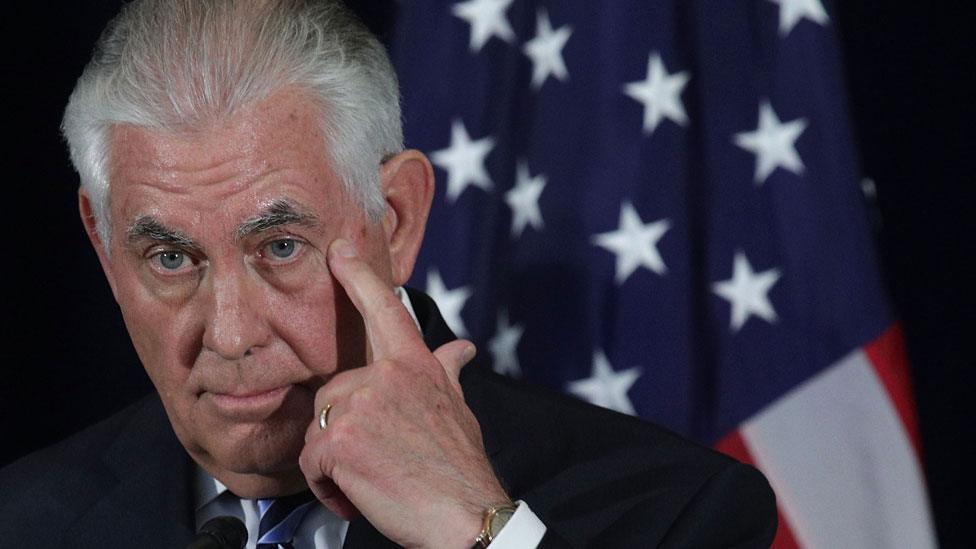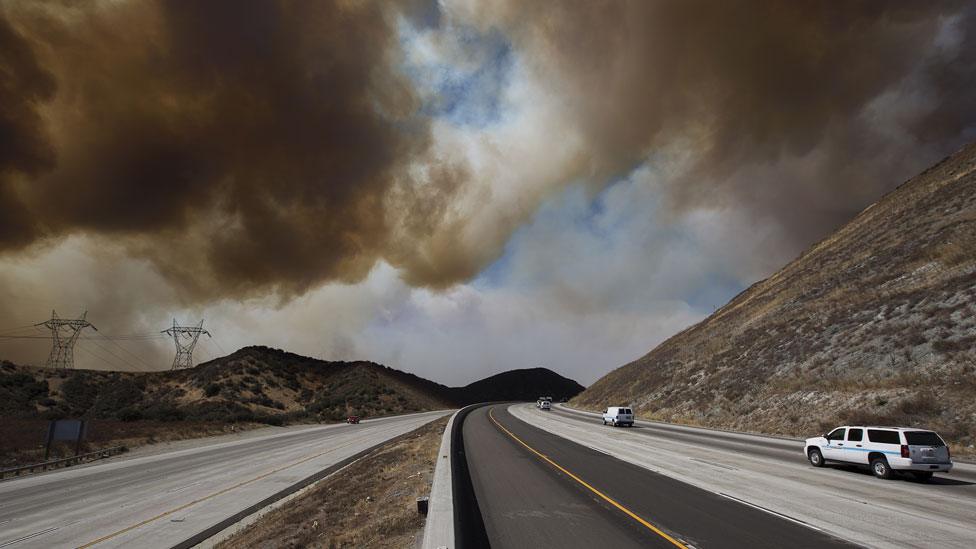Trump's 'climate Brexit' blow to Tillerson
- Published

Last month when Rex Tillerson tried to translate "America First" into foreign policy terms for a bemused audience of State Department employees, he probably didn't expect it would come to mean "America Alone."
The secretary of state was, by all accounts, a member of the "Remain Campaign" lobbying against a US withdrawal from the Paris Agreement.
So President Trump's "Climate Brexit" was a blow to him - in an ironic twist the fossil fuel company he used to head supports the accord while the government he now represents does not.
It was also a blow to the State Department, and to diplomacy.
How much of a personal setback is not clear because on this, as on other issues, Tillerson kept a low profile.
Twenty-four hours after the decision, the only comment he'd made was an aside at a photo-opportunity. He declared that the US would continue its efforts to reduce greenhouse gas emissions and appealed for partners to keep things "in perspective".
Tillerson had previously said the US should "maintain its seat at the table" on international climate conversations, a sensible position for the nation's top diplomat and one that he reportedly maintained in White House debates on the Paris Agreement.
But publicly he showed none of the passion demonstrated by his predecessor, John Kerry, who powered negotiations on the deal. It seems the president's daughter, Ivanka, took the lead in fighting the corner for the Remainers. And the role of super-engaged interlocutor apparently fell to the climate change sceptic in the administration, Environment Protection Agency head Scott Pruitt, who spoke at the Rose Garden ceremony.
Mr Tillerson did not attend, whether out of resignation or as an everyday-act-of-resistance, we don't know. A State Department official said only that he was in his office and "maintained his schedule, preparing for his trip today to Australia and New Zealand".
No doubt Pruitt (and his ally, White House adviser Steve Bannon) had an easier task than Tillerson, given that he was preaching to a president sympathetic to his economic and nationalist arguments.

Wildfires in California have been linked to climate change
But the results are another professional blow to the secretary of state. He's already facing a proposed budget cut that looks to gut his department. And the president's son-in-law Jared Kushner, who has even less diplomatic experience than he does, has forged a parallel foreign policy track from the White House.
Clearly, the Paris withdrawal was also bad news for the State Department, which has yet to issue a statement.
Where it once straddled the front lines of global climate negotiations, it's now been dropped off the map.
The US does remain a member of the UN framework for climate change issues, the UNFCCC, but those meetings have become mostly about the Paris Agreement.
Finally, it's a rejection of a monumental diplomatic effort by more than 190 countries over many years to strike all the balances that needed to be struck.
"We have now slapped every country in the world in the face," says Todd Stern, the US Special Envoy for Climate Change in the Obama administration.
"We've said we know this matters to you a lot, we know this is a huge potentially epic issue for the world, we know that some of you are particularly vulnerable, but we drop out. It's the worst way you could treat other countries."
To be fair, this is not entirely untravelled ground - remember George W Bush's decision against ratifying the 1997 Kyoto climate change treaty.
But it is more starkly isolationist, and this is a different Washington - in private chats, international diplomats from across the global spectrum complain that normal channels for getting and giving information at the State Department and White House are still unstaffed. They struggle to find the people who can listen to their concerns or tell them what's going on.
So while this will not break alliances, it could be more difficult to pick up the pieces and say we can still be friends.
Follow Barbara on Twitter, external
